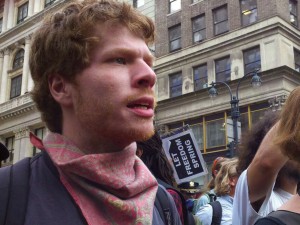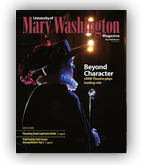
Activist and organizer Philip Arnone, a leading force behind the Occupy Wall Street movement against societal inequality in America, participates in this year’s May Day demonstration in New York City. Arnone, a grad student at New York University who considers himself a “lifelong activist,” became interested in anarchist theory during his undergraduate years at UMW. Photo by Amy Bookbinder.
In September 2011, Philip Arnone ’08 went to a protest in lower Manhattan’s Zuccotti Park. An experienced activist, he had seen nascent protest movements before – and he had seen most of them fall apart. Unimpressed, he didn’t think the one in the Financial District would last.
“We had a few arrests that day, not much,” he said of what would become the Occupy Wall Street movement. “It was kind of anticlimactic.”
A week later, protesters still held the park. That’s when impatient police officers swooped in to make arrests, and things got rough. “I’ve seen police violence before, but it had never been on the level that it was that day,” Arnone said.
He fled, then found himself organizing others who had escaped. He led a march to police headquarters to demand that those who were arrested be released; then he joined the other protesters as they returned to the Zuccotti Park.
“After I’d done that, I was hooked,” he said. “And things just escalated from there.”
As protests took hold, the Occupy Wall Street movement spread around the country. Arnone became a leader, searching for ways to put Occupy’s goals into action. In doing so, he drew upon the activist experience he’d gained at UMW.
The 26-year-old grew up in Blacksburg and Fairfax, Va. After touring campuses around the state, he chose UMW because he liked the feel of it. “Mary Washington always stood out as a good liberal arts college,” he said.
Once on campus, Arnone got interested in a college club devoted to discussing anarchist theory. “There were a bunch of really smart, dedicated people who were trying to figure out how to make these ideals translate into practical action,” he said.
That club created the Living Wage Coalition, which pressed for higher wages for UMW’s lowest-paid employees, among them custodians and groundskeepers. Eventually the employees got a pay increase, though not as much as the coalition had hoped. “We learned a lot about how to organize and about what works,” Arnone said. “It definitely made me the organizer and activist I am.”
Between earning a bachelor’s degree in sociology and organizing Occupy Wall Street, Arnone worked as an activist in Philadelphia for UNITE HERE, a union organization. He worked on housing issues and on promoting community gardening projects. In fall 2010, he enrolled in the John W. Draper Interdisciplinary Master’s Program in Humanities and Social Thought at New York University.
Graduate school doesn’t keep Arnone from activism. He’s deeply involved in efforts in New York City to organize immigrant workers and to use the Occupy movement to support the workers’ demands for better pay and benefits. “I think this is unique – workers working hand in glove with Occupy Wall Street to challenge some one percenters,” he said.
